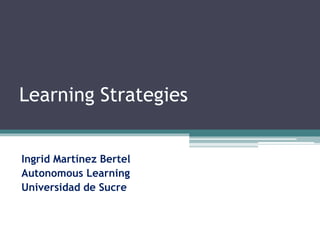Learning strategies
- 1. Learning Strategies Ingrid Martínez Bertel Autonomous Learning Universidad de Sucre
- 3. What are Learning strategies? Learning strategies seem to be "tricks" learners how to help them remember things better or to do tasks more efficiently, there are different learning strategies such as cognitive and metacognitive of which we will talk.
- 4. Cognitive Strategies Cognitive strategies are management skills that the student himself acquired, presumably over a period of several years, to govern its own process to meet, learn, think and solve problems. Now some of these strategies:
- 5. Cognitive Learning Activities • Organization information through mind mapping schemes summaries, etc. • Repetition and storage of information using memory techniques. • Communication and use of information by synthesis reports, etc. • Customization and creativity right through brainstorming, simulation and games.
- 6. • Regulation, control and evaluation through tests, bug fixes, etc.
- 8. Metacognitive Strategies Metacognitive strategy is a memorable "plan of action" that provides students an easy to follow procedure for solving a particular math problem, metacognitive strategies are taught using explicit teaching methods. Metacognitive strategies include the student's thinking as well as their physical actions.
- 9. Metacognitive Learning Activities • Propose and appropriate goal • Being aware of the objective to be achieved • Plan strategies to meet that goal • Self-monitoring process • Review and evaluation of the final product










